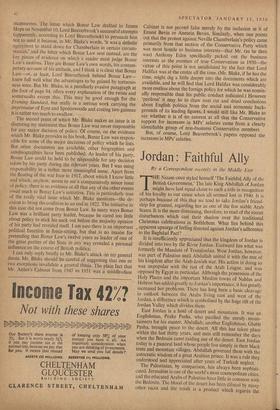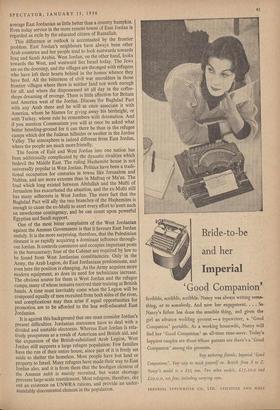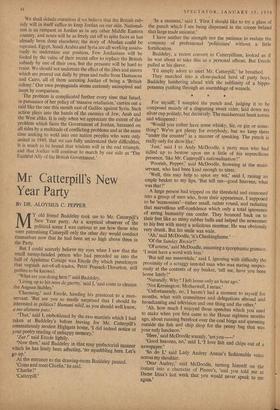Jordan : Faithful Ally
By a Correspondent recently in the Middle Last THE Nizam once styled himself 'The Faithful Ally of the British Government.' The late King Abdullah of Jordan might have laid equal claim to such a title in recognition of his loyalty to our cause when all seemed lost in 1940. It is perhaps because of this that we tend to take Jordan's friend- ship for granted, regarding her as one of the few stable Arab States. It is the more distressing, therefore, to read of the srecent. disturbances which cast their shadow over the traditional Christmas celebrations in Bethlehem. What lies behind this apparent upsurge of feeling directed against Jordan's adherence to the Baghdad Pact?
It is insufficiently appreciated that the kingdom of Jordan is divided into two by the River Jordan. Eastward lies what was formerly the Mandate of Transjordan. West Jordan, however.
was part of Palestine until Abdullah united it with the rest of his kingdom after the Arab-Jewish war. His action in doing so was unpopular with the rest of the Arab League, and was opposed by Egypt in particular. Although the possession of the Holy Places and the important Muslim towns of Nablus and Hebron has added greatly to Jordan's importance; it has greatly increased her problems. There has long been a basic cleavage in outlook between the Arabs living east and west of the Jordan, a difference which is symbolised by the huge rift of the Jordan Valley which divides them.
East Jordan is a land of desert and mountains. It was an Englishman, Peake Pasha, who pacified the unruly. moun- taineers for his master, Abdullah; another Englishman, Glubb Pasha, brought peace to the desert. All this has taken place within the last thirty years, and men still remember the days when the Bedouin came raiding out of the desert. East Jordan today is a pastoral land whose people live simply in their black tents and mountain villages. Abdullah governed them with the autocratic wisdom of a great Arabian prince. It was a rule they understood and appreciated after years of Turkish neglect. The Palestinian, by comparison, has always been sophisti- cated. Jerusalem is one of the world's most cosmopolitan cities. and the educated Arabs of Palestine have little in common with the Bedouin. The blood of the desert has been diluted by many other races and the result is a product which regards the average East Jordanian as little better than a country bumpkin. Even today service in the more remote towns of East Jordan is regarded as exile by the educated citizen of Ramallah.
This difference in outlook is accentuated by the frontier problem. East Jordan's neighbours have always been other Arab countries and her people tend to look eastwards towards Iraq and Saudi Arabia. West Jordan, on the other hand, looks towards the West, and westward lies Israel today. The Jews are on the doorstep, and the villages are thronged with refugees who have left their hearts behind in the homes whence they have fled. All the bitterness of civil war smoulders in those frontier villages where there is neither land nor work enough for all, and where the dispossessed sit all day in the coffee- shops dreaming of revenge. There is little affection for Britain and America west of the Jordan. Discuss the Baghdad Pact with any Arab there and he will at once associate it with America, whom he blames for giving away his birthright, or with Turkey, whose rule he remembers with detestation. And if you mention Communism you will at once be asked what better breeding-ground for it can there be than in the refugee camps which dot the Judwan hillsides or swelter in the Jordan Valley. The atmosphere is indeed different from East Jordan, where the people are much more friendly.
The fusion of East and West Jordan into one nation has been additionally complicated by the dynastic rivalries which bedevil the Middle East. The ruling Hashemite house is not universally popular in West Jordan. Politics have been a tradi- tional occupation for centuries in towns like Jerusalem and Nablus, and are more extreme than in Mafraq or Ma'an. The feud which long existed between Abdullah and the Mufti of Jerusalem has exacerbated the situation, and the ex-Mufti still has many adherents in West Jordan. The mere fact that the Baghdad Pact will ally the two branches of the Hashemites is enough to cause the ex-Mufti to exert every effort to 'avert such an unwelcome contingency. and he can count upon powerful Egyptian and Saudi support.
One of the most bitter complaints of the West Jordanian against the Amman Government is that it favours East Jordan unduly. It is the more surprising, therefore, that the Palestinian element is so rapidly acquiring a dominant influence through- out Jordan. It controls commerce and occupies important posts in the bureaucracy; four of the Cabinet are required by law to be found from West Jordanian constituencies. Only in the Army, the Arab Legion, do East Jordanians predominate, and even here the position is changing..As the Aimy acquires more modern equipment, so does its need for technicians increase. The obvious source for them is West Jordan and the refugee camps, many of whose inmates received their training at British hands. A time must inevitably come when the Legion will be composed equally of men recruited from both sides of the river, and complications may then arise if equal opportunities for promotion are to be afforded to the less well-educated East Iordapian.
It is against this background that one must consider Jordan's present difficulties. Jordanian statesmen have to deal with a divided and unstable electorate. Whereas East Jordan is rela- tively prosperous as a result of American and British aid, and the expansion of the British-subsidised Arab Legion, West Jordan still supports a large refugee population. Few families have the run of their entire house, since part of it is freely set aside to shelter the homeless. Most people have lost land or property to Israel. Many refugees have made their way to East Jordan also, and it is from them that the hooligan element of the Amman sukh is mainly recruited, but water shortage prevents large-scale resettlement. Most refugees, therefore, eke out an existence on UNWRA rations, and provide an under- standably discontented element in the population. We shall delude ourselves if we believe that the British sub- sidy will in itself suffice to keep Jordan on our side. National- ism is as rampant in Jordan as in any other Middle Eastern country, and noses will be as freely cut off to spite faces as has already been done elsewhere; the story of Abadan could be repeated. Egypt. Saudi Arabia and Syria arc all working assidu- ously to undermine our position. Few Jordanians will be fooled by the value of their recent offer to replace the British subsidy by one of their own, but the pressure will be hard to resist. We should not underrate the effect of the jibes and sneers which are poured out daily by press and radio from Damascus and Cairo, all of them accusing Jordan of being a 'British colony.' Our own propaganda seems curiously uninspired and inept by comparison.
The problem is complicated further every time that Israel, in pursuance of her policy of 'massive retaliation,' carries out a raid like the one this month east of Galilee against Syria. Such action plays into the hands of the enemies of Jew, Arab and the West alike. It is only when we appreciate the extent of the problem which faces the Government of Jordan, harassed on all sides by a multitude of conflicting problems and at the same time seeking to weld into one nation peoples who were only united in 1949. that we can fully understand their difficulties. It is much to he hoped that wisdom will in the end triumph, and that Jordan will continue to march by our side as 'The Faithful Ally of the British Government.'




































 Previous page
Previous page